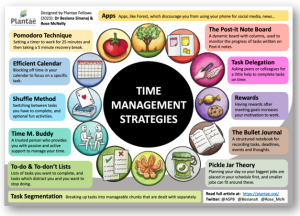
Master Your Time: Effective Time Management Strategies for Increased Efficiency
Time. The most valuable, yet often most squandered, resource we possess. We chase deadlines, juggle responsibilities, and often feel overwhelmed by the relentless tick-tock of the clock. But what if we could reclaim control? What if we could transform our relationship with time, shifting from frantic reaction to proactive mastery? This article unveils effective time management strategies to boost your efficiency and unlock your true potential.
Beyond the To-Do List: Understanding Your Time Personality
Before diving into techniques, it’s crucial to understand your unique relationship with time. Are you a meticulous planner, a spontaneous free spirit, or somewhere in between? Recognizing your natural inclinations is the first step toward effective time management. Are you easily distracted? Do you thrive under pressure or prefer a calm, organized approach? Self-awareness is key.
Time Audit: Unveiling Your Time Thieves
A time audit is your personal detective work, revealing where your time truly goes. For a week, meticulously track how you spend each hour. Be brutally honest. You might be surprised by the time-wasting activities lurking in plain sight. This audit isn’t about self-flagellation; it’s about gaining insight to build a more effective system.
| Time Thief Category | Example | Solution |
|---|---|---|
| Social Media & Distractions | Endless scrolling, unproductive browsing | Set time limits, use website blockers, utilize focus apps |
| Unnecessary Meetings | Meetings without clear agendas or outcomes | Request agendas beforehand, limit meeting duration, suggest alternative communication |
| Poor Prioritization | Tackling low-priority tasks first | Use the Eisenhower Matrix (urgent/important) |
Strategies for Time Mastery: Beyond the Buzzwords
Forget the generic advice; let’s explore practical, actionable strategies:
-
The Pomodoro Technique: This classic method involves working in focused bursts (e.g., 25 minutes) followed by short breaks. It leverages the power of focused attention and prevents burnout.
-
Time Blocking: Schedule specific blocks of time for particular tasks. Treat these blocks like appointments you can’t miss. This fosters discipline and prevents task-switching.
-
Eisenhower Matrix: Categorize tasks based on urgency and importance (urgent/important, important/not urgent, urgent/not important, neither). Prioritize accordingly.
-
Batching Similar Tasks: Group similar tasks together. Answering emails all at once, making all your phone calls in one go – this minimizes context switching and increases efficiency.
-
Learn to Say No: Overcommitting is a recipe for disaster. Politely decline requests that don’t align with your priorities or capacity. Protecting your time is crucial.
-
Delegate When Possible: Don’t be a superhero. If you can delegate tasks, do it. This frees up your time for higher-value activities.
Technology as Your Ally: Tools for Time Management
Numerous apps and tools can assist your journey to time mastery. Explore calendar apps (Google Calendar, Outlook Calendar), task management apps (Todoist, Asana), and focus apps (Forest, Freedom) to find what suits your style. Experiment and find the tools that enhance your workflow.
Continuous Improvement: The Ongoing Journey
Mastering your time isn’t a destination, but a continuous journey. Regularly review your strategies, adapt your methods, and reflect on your progress. What works? What doesn’t? Be flexible and willing to adjust your approach as needed. The key is consistent self-assessment and refinement.
Conclusion: Reclaim Your Time, Reclaim Your Life
Effective time management is not about cramming more into your day; it’s about maximizing your impact and minimizing stress. By understanding your time personality, identifying time thieves, implementing effective strategies, and leveraging technology, you can reclaim control of your most valuable resource – your time. Embrace the journey, and watch your efficiency soar.

Additional Information
Delving Deeper into Master Your Time: An Analysis of Effective Time Management Strategies
While the core tenets of effective time management – prioritizing tasks, eliminating distractions, and utilizing scheduling techniques – are well-established, a deeper dive into “Master Your Time” reveals nuances crucial for achieving genuine efficiency gains. This analysis will explore key aspects beyond the surface level, focusing on the psychological, practical, and strategic considerations.
1. The Psychology of Procrastination & Its Mitigation: A common obstacle to effective time management is procrastination. “Master Your Time” likely addresses this, but a deeper analysis requires exploring the underlying psychology. Procrastination isn’t simply laziness; it often stems from fear of failure, perfectionism, or feeling overwhelmed. Techniques like the Pomodoro Technique (mentioned in most time management guides) help, but addressing the root cause is essential. Cognitive Behavioral Therapy (CBT) techniques, for instance, can help individuals identify and reframe negative thought patterns associated with tasks, thereby reducing procrastination. Studies show that CBT is significantly effective in reducing procrastination in academic and professional settings (e.g., Ferrari et al., 2007).
2. Prioritization Beyond the Urgent/Important Matrix: The Eisenhower Matrix (urgent/important) is a staple, but it lacks nuance. “Master Your Time” likely uses it, but deeper analysis requires considering context. A task’s importance might be subjective and dependent on long-term goals. Value-based prioritization, aligning tasks with overarching life goals, offers a more profound approach. For example, a seemingly “urgent” email might be less important than dedicated time for strategic planning – a task that contributes more significantly to long-term success but might not seem immediately urgent.
3. The Role of Technology & Potential Pitfalls: Technology offers powerful time management tools – calendar apps, project management software, focus apps. “Master Your Time” likely advocates their use. However, a crucial analysis point is the potential for technology to become a time sink rather than a saver. Notification overload, constant app switching, and the lure of social media can negate the benefits. Mindful technology use – scheduling specific times for checking emails, using website blockers for distractions, and practicing digital minimalism – is crucial for harnessing technology’s power without falling victim to its pitfalls. Statistics on employee productivity loss due to digital distractions (e.g., reports from workplace productivity software companies) can bolster this point.
4. The Importance of Energy Management, Not Just Time Management: A high-performing individual understands that time management is inextricably linked to energy management. “Master Your Time” might address this indirectly, but it warrants deeper consideration. Peak performance isn’t solely about cramming activities into a schedule; it’s about aligning tasks with periods of high energy and prioritizing rest and recovery. Understanding your chronotype (your natural sleep-wake cycle) and scheduling demanding tasks during peak energy periods significantly enhances productivity.
5. Adaptability & Continuous Improvement: Effective time management isn’t a static process. Life throws curveballs. “Master Your Time” should emphasize the need for flexibility and continuous improvement. Regularly reviewing and adjusting your system – be it a planner, a project management software, or a personal workflow – is vital for long-term success. Techniques like weekly reviews, goal setting, and performance analysis allow for continuous optimization. The absence of this adaptive approach is a frequent reason for time management systems failing.
Conclusion:
While “Master Your Time” likely provides a solid foundation in time management techniques, a deeper analysis reveals the complex interplay of psychological factors, technological tools, and energy management principles that truly unlock efficiency. By incorporating these nuanced perspectives, individuals can move beyond simply managing their time to truly mastering it and achieving sustainable, high-performing results. Further research into specific techniques like the Pomodoro Technique, CBT applications for procrastination, and the impact of technology on focus can provide even more granular insights into optimizing the strategies presented.
